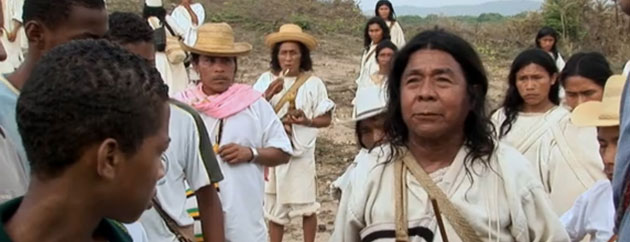
Aluna
07 June, 2012Aluna holds a long-awaited message and the anticipation of its release has been brewing, not only amongst documentary film lovers, but anyone that remembers the BBC’s 1990 film, From The Heart of The World: The Elder Brother’s Warning. The latter, directed and presented by Alan Ereira, told the story of the Kogi people, an untouched pre-Colombian tribe living in the Sierra Nevada de Santa Marta mountains in South America.
The Kogi are the last descendants of the Inca and Aztec civilizations. For them, the earth is a living organism and they are her protector. For 400 years they restrained from communicating with the modern world until Alan Ereira made contact with them over 20 years ago. The Heart of the World is their message to us. They see modern humankind as the ‘younger brother’, destroying the planet. They believe they must tell us to stop the greed, destruction and pollution, and how to redress the balance of man and nature. The legacy of From The Heart of The World spread far and wide as the Kogi once again withdrew. It not only changed the attitude of Colombian people towards indigenous tribes, but helped shape the Rio Conference.
It is the Mama’s, the Kogi’s spiritual leaders, who transmit their message. They do not believe we have listened to them so they called Alan Ereira back to make this film. In 1990 they spoke their words but have since realised that ‘younger brother’ learns, not through his ears, but through his eyes. Ereira travels with them to capture their communications visually. The format of this documentary reflects the emphasis on the visual in every way. There is no verbal introduction or continuous voice over, traditional in a documentary of this nature. Mood and characters are introduced through music and juxtaposed shots in a manner that gives it the feeling of foreign feature film rather than a serious documentary. The stunning landscape of their home, a pyramid shaped mountain rising over 18,000 feet above sea level, is shot from above in sweeping panoramas. The narrative is held together through graphics representing the land and how they travel across it. This is, at once, its strength and weakness. Our understanding of their message builds as the viewer is brought back again to this image, growing as the Kogi make their journey.
Many people will come to this film having seen From The Heart of The World but for those that haven’t, there are more than a few gaps. There are some clips of the 1990 film but as Aluna is only 90 minutes long, there is certainly room for more. The trailer acts as a helpful introduction, summarising what was shown in From the Heart of The World, and is definitely worth watching beforehand. It will either bring you up to speed or refresh your memory. In this way it is wildly different from its predecessor yet I cannot help but wonder if its aftermath will be as effective.
Ereira follows the Kogi to Sussex, England, where they obtain 400km of gold thread, and back to their mountain home and along the coast of Columbia, as they walk between various significant points where mountain rivers meet the sea. They believe that industrial activity on the coast affects the land and animals further up the mountains. Their ideas seem, at first, alien to the average modern mind brought up on rationality or evidence-based science and the connection between this journey and their message is not immediately clear to viewer or filmmaker. It is through metaphor and narrative that they understand existence. The story of how The Mother made earth as a living being, the mountain like the heart and rivers like veins, is wonderfully depicted in a comprehensive and appealing way. Meetings with top scientists intersect the narrative. At first this felt crude but as the Kogi’s world-view becomes more apparent it is clear that the top scientists reinforce what they are saying, only in a very different language.
The importance of the Kogi message continuously speaks to the viewer through close-up shots of Mama Shibulata and his daughter. His wide mouth drooping at the corners across his face reminds us that from his perspective, there is not much to smile about. The strength of his belief and magnificent presence is evident. Even in Sussex where they collect the gold thread they need for the journey, he appears un-phased, holding his space, all the time focused on his mission. This image and his relative silence reinforce the sombre, serious nature of the subject. It is a subtle rather than sensationalist method of transmitting one of the most important messages to modern human kind.
By the end of Aluna I did not doubt their message or methods, only feared that it would not reach people in the way From The Heart of The World did. I was left with many questions about the way the Kogi’s live and what Alan Ereira’s intention was in this re-meeting. Did he feel some deeper sense of duty or obligation or is he just a documentary maker? Despite gaps or questions, it is an amazing film. It is a very focused and intense look at one element of a fascinating subject. The Kogi’s take on environmental issues are wider and go deeper than any of the scientists interviewed. It should be compulsory viewing if ‘younger brother’ wants to continue to live on this planet without obliterating the environment or human kind.
Aluna is showing as part of Sheffield Doc/Fest from the 13-17 June. More information and screening times can be found here.
Follow Sounds and Colours: Facebook / Twitter / Instagram / Mixcloud / Soundcloud / Bandcamp
Subscribe to the Sounds and Colours Newsletter for regular updates, news and competitions bringing the best of Latin American culture direct to your Inbox.

